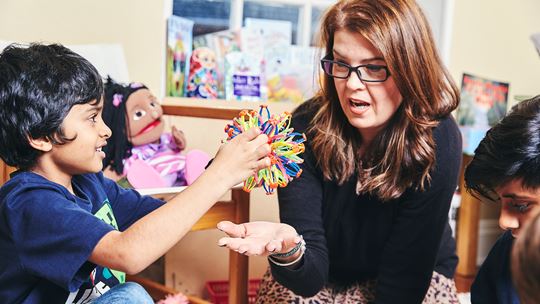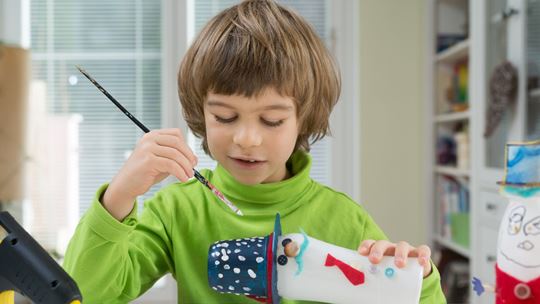Father's Day - Male Role Models in Foster Care: The Strength of Variety
As we celebrate Father’s Day, we consider the male role models present in the lives of children and young people in care.

The Importance of Male Role Models
Role models are people we look up to; they empower us to reach our full potential, motivate us to achieve extraordinary things and help us to understand our identity.
A study completed by the National Literacy Trust found that 93.4% of children aged 7 – 18 said they had at least one role model, the most popular being mums and dads. For children in care, parents as role models can be complex because they aren't living with their birth family and may have experienced adversities whilst in their care.
Children and young people are impressionable, and male role models can:
- Impact their behaviour, beliefs, relationships, education, aspirations, mental health, tastes and values.
- Help children and young people accept and treat everyone with respect, including those from different backgrounds with distinct cultural norms and values.
- Positively influence children and young people's understanding of their identity.
Why is identity important?
If we know who we are and where we belong, we can become the best version of ourselves. Belonging is so crucial that it's tier three on Maslow's hierarchy of needs.
People we encounter, our surroundings and the media can all play a role in developing and understanding our identity. So, children and young people need diverse role models to define what identity means to them, including role models from their culture, ethnicity and socioeconomic background. By seeing role models who are similar to them succeed, they will be able to visualise that achievement, and it will become more attainable for them.
Male role models can influence both sexes. They can teach a boy or young man what it means to be a man, how to behave towards women and how to react in adversity. They can teach girls and young women about equality, independence and their value.
Male Foster Parents are Positive Role Models
Our male foster parents take significant steps to improve the lives of children and young people in care:
- They challenge gendered assumptions by being caring, patient and nurturing.
- They take a therapeutic approach to foster care to help young people heal from their trauma.
- They offer support and guidance through life challenges and changes, such as moving schools.
- They listen to children and young people with all their senses, so they understand what's happening in their inner world.
- They offer stability and emotional support.
- They accept young people for who they are, celebrating their individuality and helping them explore their identity.
- They collaborate with other professionals to help children achieve the best possible outcomes.
- They teach children and young people life skills, such as conflict resolution, stress management and self-awareness.
- They are proactive, advocating for children and young people's needs.
Our male foster parents are extraordinary role models who use their natural qualities to make a difference to children and young people.

The Unsung Heroes of Foster Care
In a podcast interview for Fearne Cotton’s Happy Place, Ashley-John Baptiste discusses the book he has written about his experience growing up in care.
Ashley highlights the significant people he encountered in childhood whose small acts of kindness and love made a huge impact. For example, Ashley lived in a care home for some of his childhood, and Miles, a shift worker, ensured Ashley attended school.
Ashley says, "Every day at 7 am, without fail, he made sure I got up to go to school". This small act played a fundamental role in the long-term outcomes for Ashley.
Ashley also remarks on the difference it made joining a family that welcomed and connected with him, encouraging him to reach his full potential.
Watch the podcast to discover what it was like for Ashley growing up in care and how unsung heroes and seemingly insignificant micro-moments can impact the lives of children and young people
ISP’s Male Foster Parents
From single men to those in couples, here are some examples of ISP male foster parents who dedicate their lives to helping children and young people by modelling resilience, perseverance and compassion.

Jeremy
Jeremy, a single foster parent for ISP, discusses his experiences of fostering as a male in his fostering story. Although you don’t need experience in childcare to foster, Jeremy was able to apply his background in youth work to his role.
In Jeremy's case, his friends noticed his potential and prompted him to consider fostering. Through this encouragement and Jeremy's position at the time, circumstances aligned, enabling him to apply. In his story, he describes how his experiences have impacted him and what he has learned on his fostering journey. As Ashley-John Bishop mentions in his interview, Jeremy also highlights the significance of “recognising the moments where you've made a difference to a young person's life.”
Another of Jeremy's reflections is that “Part of the art of the job of fostering is to try and give that young person a normal experience of life so that they don't feel different from their peers or left out."

Andy and Ran
Andy and Ran’s fostering story provides an insight into becoming foster parents as a male couple, including the fostering process, the moment they welcomed their first child and adapting to family life.
They started their journey during the COVID-19 pandemic, but their determination, resilience and creative thinking helped them continue to support the child in their care. For example, they didn't let the pandemic prevent them from encouraging Jessica’s passion for singing.
They explain, "We learnt quite quickly that Jessica has a passion for singing, so we set up virtual singing lessons for her for half an hour once a week. Her intentions are to be a professional singer when she grows up, so we thought it would be a great way to help Jessica build her confidence."
They demonstrate that foster parents go above and beyond to help children and young people in care reach their full potential and follow their dreams.
Impact of positive male role models on young people
Mental Well-being
Suicide is the leading cause of death for men under 50, and 75% of people who end their own life in the UK each year are male.
Old-fashioned gender ideologies could be a factor contributing to these horrifying statistics. When boys believe the notion that they need to be strong and hide their emotions to be masculine, it prevents them from seeking help when they are struggling now and in adult life.
Positive male role models can redefine how boys perceive 'masculinity' and encourage them to share their emotions. Popular male celebrity role models, such as Dwayne 'The Rock' Johnson and Ryan Reynolds, are making waves by publicly discussing their mental health struggles and encouraging boys and young men to do the same.
As a male foster parent, you can encourage the child in your care to talk openly about their mental health by doing the same. Leading by example, you can change their perception of masculinity by demonstrating that there are many ways to be a man.
Identity
Social media can be a positive source of male role models. If the child in your care has another culture, ethnicity, or socioeconomic background, or if they’re part of the LGBTQIA+ community, they may look to social media to help them understand their identity.
These male role models could offer comfort and support and help the child in your care celebrate their individuality. They may follow male role models who observe their cultural traditions through food, music and fashion or who may be campaigning for social change that impacts them.
At ISP, we provide training and support on online content, helping you as a foster parent develop strategies to prevent young people from accessing potentially harmful material online.
Education and Aspirations
Male role models can encourage children and young people to consider careers previously associated with a particular gender. For example, a boy in your care may not have considered a career in teaching because 75.5% of teachers are female. A positive role model who breaks this trend, such as a male teacher, could encourage them to pursue this career. Similarly, girls are less likely to pursue careers in science, technology, engineering and maths (STEM). Male teachers can encourage them to engage in STEM by being inclusive and valuing their contribution.
As a male foster parent, you can help advocate for the child in your care's education, making sure that their school isn't motivating them to pursue careers based on their gender. At home, you can inspire them by encouraging them to take part in previously gendered activities. For example, you could ask the girl in your care to help with DIY, or if you have a boy, they could help you cook. By doing so, you are making these activities the norm for all genders.

PACE Parenting and Male Role Models
As a male foster parent, you have a unique and privileged opportunity to be a role model for the young person in your care. Often, this starts by developing the foundations of a safe, trusting relationship, before helping them to explore themselves and the world around them.
The PACE parenting approach which stands for Playfulness, Acceptance, Curiosity, and Empathy, is a great way to build a nurturing relationship as it encourages positive, healing interactions with your young person, even in the more challenging times.
The child in your care may have had a difficult relationship with a significant male figure in their life. But by using the PACE approach, over time, you can build trust, help change their perceptions and become a positive male role model.
Male foster parents are on the front line performing small acts of kindness that profoundly influence the children and young people they care for. If you’re interested in joining other male foster parents on this journey, get in touch.





